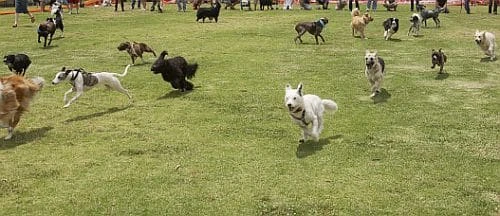Choosing a Dog Breed, Choosing a Dog for Family, Best Dog Breed for Children

In this section follow our free tips on choosing a dog breed from our selection of some of the best dog breeds. It is important when choosing breed of dog that you don’t rush into it.
Unfortunately, buying a dog or puppy on a whim or impulse will often lead the dog to being taken on by a charity such as The Dogs Trust.
This is obviously not an ideal solution for you or your dog – consequently throughout this page we have provided some useful free tips and techniques that may help you when you are deciding on which breed to go for.
Before we go into detail about some of the things that need to be considered when choosing a breed of dog – you may find this free and excellent little tool helpful when choosing a dog breed.

Take your time when choosing a dog breed.
Choosing a Dog Breed
Try using the breed selector tool to find a breed of dog that is suited to your environment and social background.
If you have a young family you need research which is the best dog breed for children.
Unfortunately many new owners don’t do their research when choosing a dog and this can often lead to many problems.
This is mainly due to the fact that every breed has different characteristics and behavior traits.
Some simple background research on the best dog breeds for you and your family can match you with the perfect dog for your personality.
Take a look at your own personal circumstances before you get a dog or puppy.
If you work all day and don’t get back to the House until late is it really fair to get a dog in the first place.
Research the breeds:
Do you have the time to follow a strict training regime?
Will you be able to properly house train a new puppy?
Check how large a breed will grow?
Does the breed have specific traits that may make obedience training difficult?
Can you trust the breed around young children?
Some dog breeds need more exercise than others so are you able to walk your dog everyday?
Can you afford to get a dog in the first place?
You need to look into the costs of dog insurance, dog food and vet bills.
In our section on choosing a dog we provide an average guide to the cost of owning a dog or puppy.
It may seem like allot to take into consideration but owning a dog is a big commitment and something that does need to be considered wisely.
Choosing a Dog Breed
Puppy Farms
A puppy farm is basically where a person or group of people breed large amounts of dogs to provide an endless supply of puppies.
This disgusting trade has no interest in the welfare of each puppy and the puppy farms are all run purely for profit and to make as much money for each puppy as is feasibly possible.
Ok so you can probably tell that we are not big fans of puppy farms – never have and been and never will be.
Although some puppy farms do have a license and do provide puppies that are kennel club registered and have a certificate of pedigree – they are still bred for profit and not for love.
Breeding dogs is quite a costly exercise, consequently puppy farms aim to cut costs as much as possible.
It is quite common for breeders to start breeding from bitches that are too young and often too regularly.
Young puppies and adult dogs are often left in very cramped conditions and fed just enough to survive and continue breeding.
This is why choosing a dog breed is so important to get right and that you research where you are getting your dog from.
Although it is pretty obvious when you first walk into a puppy farm – take a look around as even if you think it looks ok sometimes it just doesn’t feel right.
By purchasing a puppy from a puppy farm you can expect numerous problems – at best your puppy may have behavior problems and at worst your puppy could have parasitic infections inherited diseases, and even die from serious illnesses such as parvo virus, gastroenteritis and distemper.
Below is a quick reference list to help when choosing a dog breed and how to spot a puppy farm.
- If you really are after a pedigree – go to a recommended breeder – you can get a list from the breed club. You can get details of the accredited breeder scheme from The kennel Club.
- Puppy farms are often advertised on the Internet and in your local newspaper.
- Always ask to see the puppy with its mother – a puppy farm owner may want to meet just with the puppy.It’s your job to be suspicious.
- If you are worried about living conditions or you feel that the puppies are being badly treated – contact the RSPCA.
- A good breeder normally has a waiting list and will ask you lots of questions so that they know their puppy is going to a good family.
Choosing a Dog Breed
What about the Family?
It’s important that you take into consideration your family when getting a dog or puppy.
Would you still want a dog if your wife becomes pregnant?
Is your House big enough for a particular breed e.g. a Mastiff may not be the ideal dog to have in a small flat.
Ask your family what they feel is the perfect breed – it may even be a good idea to purchase a book on dog breeds and go through it with the family.
A fatal error is to not think things through and then go and look at a puppy and before you know it you are taking a dog home that is not ideally suited to you and your family.
When you and your family have chosen a particular breed it is very important that you start socializing the dog or puppy with the whole family especially if you have young children.
More on this in our section on puppy socialization.
Choosing a Dog Breed
A quick guide to some of the best dog breeds (chosen by our readers) and their personalities, characters and behavior.
- Beagle – Quite a sociable dog and excellent with children – can be difficult to train.
- Pug – Great with Children, very affectionate and very clever.
- Shih -tzu- One of our favorites. Very affectionate, intelligent and friendly. Can have problems with their eyes and ears though.
- Jack Russell – Very intelligent, lively and energetic, watchful and courageous. Can be a little bit yappy.
- King Charles Spaniel – A lovely lap dog, sociable, gentle and intelligent – can be playful if in the right mood.
- Boston Terrier – Boston Terriers make great companions, extremely intelligent, lively and energetic. This breed learn obedience training quite fast.
- Border Terrier – Lively and fearless – can be difficult to train as rather obstinate.
- Staffordshire Bull Terrier – Although quite a powerfully built dog, they are affectionate with children, courageous but not always good with other dogs.
- West Highland Terrier – Quite boisterous, playful, loyal and devoted – also quite easy to train.
- Yorkshire Terrier – Very lively, devoted and friendly. They are quiet fearless but can also be a little stubborn.
- Cocker Spaniel – Affectionate, intelligent and trustworthy. Quite good with children.
- Poodle – Very spirited and energetic – are very keen to learn and are very devoted.
- Golden Retriever – Gentle and very devoted also quite an easy dog to train.




